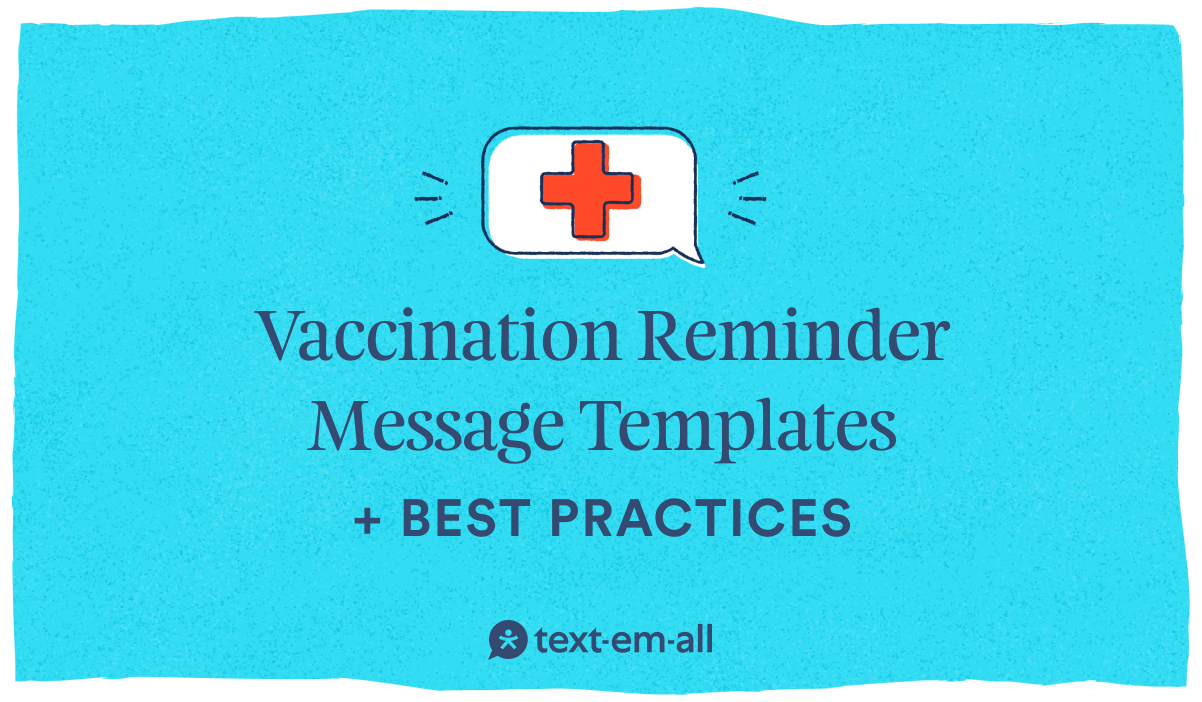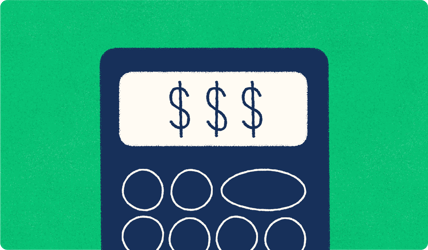
Vaccinations are important, but with the busy schedules many people keep these days, it's easy to forget to schedule an appointment before the sick season arrives.
This is where a vaccination reminder message comes in handy.
It's normal for some people to forget their vaccination appointment is coming up. And, unless they remember at the very last minute, chances are high they'll miss it. This has consequences for the patient, the medical facility, and even society as a whole. Plus, your patients don't want to miss their appointments, and you don't want to have an empty slot in your schedule.
While you can never guarantee that 100% of people will turn up for their appointments, you can increase the likelihood by sending a vaccine appointment reminder via text message.
In this blog, you'll find all you need to know about texting patients' appointments, including the process, the benefits, and the best practices to ensure your approach benefits both your practice and your patients.
Importance of Vaccine Reminders
Safe, effective vaccinations are considered one of the greatest, most important medical advancements of the 21st century. Data indicates that vaccines may:
- Decrease the rate of infectious diseases
- Reduce fatalities
- Encourage "herd immunity" (when a population becomes immune to a disease in part through vaccination)
- Prevent cancer
- Minimize the economic impact of diseases on families
- Encourage health equity
- Improve healthcare (and social) infrastructures
Need more proof? To date, vaccines have staved off approximately 6 million deaths from vaccine-preventable diseases annually.
Sending Vaccination Reminders
Sending vaccination reminders right to a person's phone may boost the likelihood that they'll make their appointment and complete their vaccination. In fact, research shows that the use of reminders increased COVID-19 vaccination rates.
Sending vaccine reminders doesn't just help your patients; it can also positively impact your organization, which we'll examine below.
Benefits of Vaccine Reminder Messages
Put simply, vaccine reminders may contribute to a healthier society. Research shows that vaccine reminders have the power to:
- Boost immunization rates
- Promote preventive care visits
- Curb costs
Let's look at a few more perks with a closer eye:
High Open Rate
Letters, emails, and phone calls are common forms of patient communication.
SMS, however, is universally considered one of the most successful communication channels:
- Text messages have an average open rate of 98%
- 91% of consumers want to receive SMS messages from businesses and organizations
Plus, over 292 million U.S. residents use text messaging. This means there's a higher chance you'll reach your patient about their upcoming vaccine appointment, whether for a flu shot or a COVID-19 booster.
Automated Process
Another massive benefit of a vaccination reminder message? You can automate the entire process of contacting your patients.
Not only will this reduce daily tasks, but it'll also help ensure your messages are sent out in the first place! Many SMS platforms also offer two-way communication, which can improve patient engagement.
SMS vaccine reminders might also:
- Enhance patient satisfaction
- Encourage faster responses
- Increase vaccine completion rates
Better User Experience
It's easy for people to forget their responsibilities, even if it's as important as visiting a healthcare provider to receive a vaccination.
Unless they've written the date down (and remembered where they wrote it down), they'll be going off memory—and, of course, memory can be pretty unreliable occasionally. Without a reminder, they may turn up on the wrong day—and having already visited once (at the wrong time), they'll be less likely to return on another date.
Sending a vaccination reminder solves this problem. If you include the specific date and time of your patient's appointment and send it to them at the right time, the appointment will be at the forefront of their minds. Specifically, they'll be less likely to forget the appointment if they receive the reminder around 24 hours beforehand.
And here's something else to consider: A patient doesn't necessarily have to be at risk of forgetting the appointment to appreciate a text reminder.
As a healthcare provider, you hope your patients know you have their best interests at heart. You aim to provide a complete service that maximizes the patient experience wherever possible. Sending an SMS vaccine reminder won't change your patient's life but will create a positive experience.
Reduce No-Shows
Maximizing the number of people who enter the door is essential to ensuring that your medical facility runs smoothly.
However, it's important to remember that there's a big difference between having appointments in the schedule and having people attending those appointments.
According to a study, around 22% of healthcare patients fail to attend their appointments. Sometimes, it's for a reason you can do nothing about: They just didn't want to go. It was intentional. However, very often, patients miss their appointments for non-intentional reasons. The appointment just slipped their mind—and this is something that you can do something about.
By sending a message to their phone, you can significantly enhance the chances that they'll attend their appointment. The result will be:
- Fewer missed appointments
- Smoother processes
- More income
It'll prevent the disorganization that can occur when people either miss their appointments entirely or turn up at the wrong time.
Public Service
SMS vaccination reminders can improve public health and safety dramatically. Vaccination campaigns have:
- Increased life expectancy
- Eradicated smallpox
- Eliminated rubella, neonatal tetanus, polio, and other diseases in several areas around the world
- Controlled measles, accidental tetanus, and several other illnesses that were responsible for high rates of hospitalizations and death among children and teens
- Reduced malaria
Vaccines also changed the entire path of the pandemic by preventing an estimated 14.4 million deaths in 185 countries and territories. In other words, SMS vaccine reminders may help build a healthier world.
How to Send Effective Vaccine Reminder SMS
So, how can you prepare your own SMS vaccination campaign?
By following SMS best practices.
If you get things right, you'll find that the service does nothing but elevate the patient experience.
Get things wrong, however, and you might find that you frustrate your patients—which you'll most definitely want to avoid! The good news is that sending a beneficial message isn't all that complicated. You'll be on the right track if you follow a few simple rules.
Timing and Frequency
We discuss vaccination reminders, but don't let the plural tone fool you! You should not be sending multiple messages to your patients. If you do, you'll only end up annoying them.
You likely know from your own experience of receiving reminder messages that while one or two can be extremely useful, many messages can be frustrating. As such, be sure to keep things respectful. You might consider sending a confirmation text when they first make the appointment and one or two more in the week leading up to the appointment. There's probably no need to send anything more than that.
To maximize the effectiveness of your vaccination reminders, you'll need to ensure that you're sending them at the right time. Sending a message several weeks before the appointment has little value because there's too much time between when your patient receives the message and when they're supposed to go to the appointment. They may forget again!
Put simply, it's best to avoid sending the reminder too early or too late in the day. For instance, sending a reminder text two hours before the appointment would likely not be effective because if the patient has forgotten, it's unlikely they'll be able to reschedule their other plans at the last minute.
The bottom line?
- Send vaccine reminders one week before the appointment and again 24 hours before the appointment (or on a timeframe that makes sense for your facility)
- Send follow-up SMS messages if an appointment is missed
Clarity and Conciseness
There's no value in sending a long, overcomplicated message to your patients. The goal is to ensure that your patients engage with the message; if it's too long, they'll be more likely to close the message without reading all of it. So, be sure to keep things simple.
When it comes to the information to include, think about what's really necessary and what isn't. Consider sending:
- The patient's name
- The time and date of their appointment
- Information about where it will take place
- What they should do if they have to cancel or reschedule
If you want to add more information that's not specifically related to the appointment details, you can include a link to your website.
It's also a good idea to ensure that the text is well-written. The message should be clearly understood by everyone, regardless of their reading level. If you're unsure about the best way to craft a message, consider hiring a copywriter.
Personalization
Keep things personal whenever you can. That applies to all communication with your patients. If they feel like you're addressing them personally, then that'll lend itself to a pretty positive experience.
By using the right text messaging software and vaccine reminder SMS template, you'll be able to include their name in the message. That looks much better than saying "dear valued patient" or anything else that's overly generic.
That said, it's also important not to get too personal. Using a name is fine, but you shouldn't share any personal details. Doing so wouldn't just be wrong for your patient—it may also be illegal.
In addition, consider the recipient of your SMS vaccine appointment reminder. You may want to adjust the content accordingly:
- For parents and guardians – Parents and guardians should receive key (but brief) information on their children's vaccines via SMS. This should also include recommended immunization schedules to help keep their children up to date (and healthy).
- For elderly populations – The flu can affect anyone at any age, but it's significantly more dangerous for older adults and/or those with chronic conditions. Sending out a flu shot reminder may save seniors from becoming seriously ill. They might also benefit from receiving immunization reminders for:
- COVID-19
- RSV
- Pneumonia
- Shingles
- Tetanus
- Diphtheria
- Whooping cough
- For at-risk populations – Reaching out to patients with a chronic condition or a compromised immune system? Consider reminding them of the importance of vaccines for:
- Influenza
- Strep
- Hepatitis A
- Hepatitis B
- Meningococcal
Call to Action
You can make your appointment reminders a one-way or two-way conversation.
If it's a one-way conversation, you'll send out the message and expect that the recipient will read it and comply.
However, you also have the option of making this a two-way conversation. In this format, your patient will need to do something to confirm the appointment.
This could be:
- Replying to the message
- Returning a call
- Clicking a link
Whether you do this will depend on your operations and whatever feels the most appropriate. This will, of course, require an additional step on behalf of your patients, and it can be a little risky. Sometimes, people won't take the time to confirm the appointment but will still turn up. That's why most facilities don't require a response. However, it's ultimately up to you.
HIPAA Compliance
Last but certainly not least, you must ensure that your SMS vaccine reminders are HIPAA compliant. This will protect your patient's privacy and prevent you from hefty penalties.
As it stands, standard SMS lacks HIPAA's mandated encryption. Mass SMS platforms like Text-Em-All, however, provide healthcare professionals like you with expert guidance on HIPAA-acceptable texts. We also offer:
- Transparent, easy-to-understand information on HIPAA-friendly SMS practices
- Secure messaging solutions
- Ongoing support in navigating the ever-evolving regulatory landscape
Plus, Text-Em-All also offers a vaccine reminder SMS template, as well as other templates for:
- Canceling
- Rescheduling
- Educational and preparatory texts
- Last-minute reminders
9 Vaccine Reminder SMS Templates
- Hi [Name]! This is a friendly reminder that it's time for your [Vaccine Name] shot. Please schedule your appointment here: [Link]. Stay healthy!
- Dear [Family Name] Family, just a reminder that [Child's Name] is due for the [Vaccine Name] vaccine on [Date]. Protect your little ones!
- Hello [Name], your appointment for the [Vaccine Name] vaccine is scheduled for [Date] at [Time]. Please confirm by replying YES or NO.
- [Name], keep our community safe! Don't forget to get your [Vaccine Name] shot on [Date/Time] at [Location]. Together, we can stay healthy!
- Hi [Name], flu season is here! Ensure you're protected by getting your [Flu Vaccine] before [Date]. Call us to book your slot now!
- Hi [Name], it's time for your second dose of [Vaccine Name]. Please come to [Location] on [Date] at [Time]. Let's complete your protection!
- [Name], ensure you're workplace-ready by getting vaccinated with [Vaccine Name] on [Date/Time]. Contact HR for more details. Stay protected!
- Hi [Name]. You missed your [Vaccine Name] appointment. Please call us at [Contact Number] to reschedule!
- Hi [Name], this is a reminder that your [Vaccine Name] appointment is scheduled for tomorrow, [Date] at [Time]. Please remember to bring your ID and any necessary documents. If you need to reschedule, contact us at [Contact Number]. See you soon!
Automate Vaccine Reminder Messages With Text-Em-All
As we've seen, texting vaccination reminders to your patients can have many benefits for them, you, and society at large. If you're ready to get started with your SMS reminder service, then be sure to give Text-Em-All a try. It's a service that'll streamline your operations and significantly improve your patient's experience of your facility.













.png?width=875&height=285&name=cta-healthcare-guide%20(2).png)